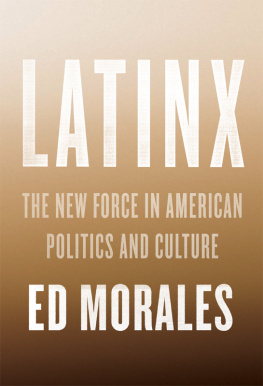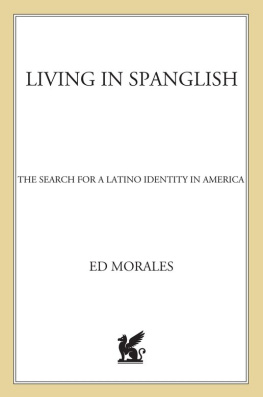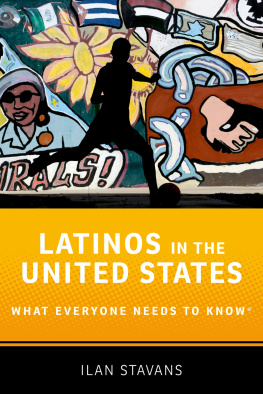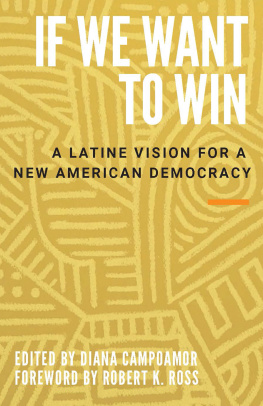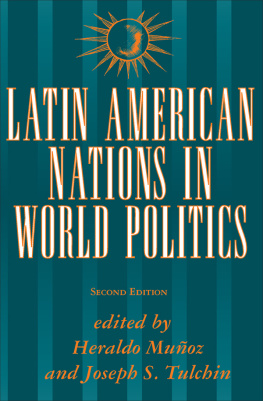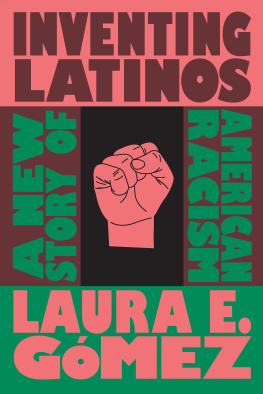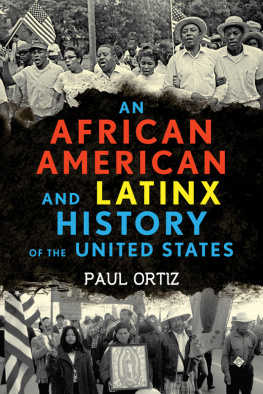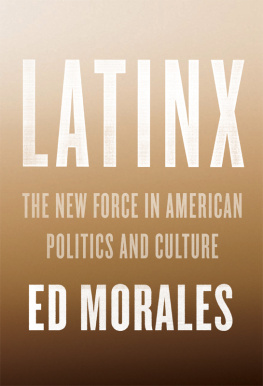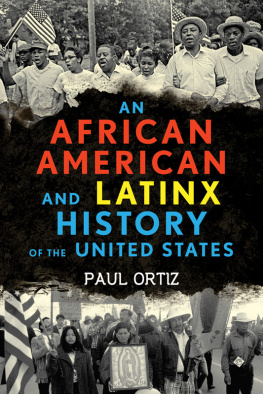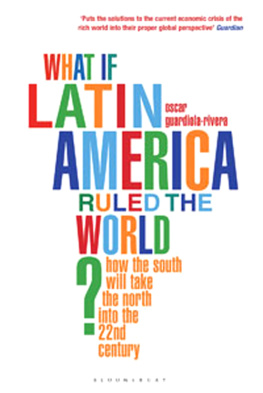Contents

Latinx
Latinx
The New Force in American
Politics and Culture
Ed Morales

First published by Verso 2018
Ed Morales 2018
Unless otherwise indicated, illustrations are in the public domain. Every effort has been made to identify copyright holders for the illustrations reproduced here. But if any oversight has been made, author and publisher will emend the text in the next edition. Thanks to Adl for kind permission to use the photographs on .
All rights reserved
The moral rights of the author have been asserted
1 3 5 7 9 10 8 6 4 2
Verso
UK: 6 Meard Street, London W1F 0EG
US: 20 Jay Street, Suite 1010, Brooklyn, NY 11201
versobooks.com
Verso is the imprint of New Left Books
ISBN-13: 978-1-78478-319-8
ISBN-13: 978-1-78478-320-4 (US EBK)
ISBN-13: 978-1-78478-321-1 (UK EBK)
British Library Cataloguing in Publication Data
A catalogue record for this book is available from the British Library
Library of Congress Cataloging-in-Publication Data
Names: Morales, Ed, 1956 author.
Title: Latinx : the new force in American politics and culture / by Ed Morales.
Description: London ; Brooklyn, N.Y. : Verso, 2018. | Includes bibliographical references and index. |
Identifiers: LCCN 2018008770 (print) | LCCN 2018015986 (ebook) | ISBN 9781784783198 (United States E book) | ISBN 9781784783211 (United Kingdom E book) | ISBN 9781784783198 (hardback) | ISBN 9781784783198 (US ebook) | ISBN 9781784783211 (UK ebook)
Subjects: LCSH: Hispanic AmericansPolitics and government21st century. | Hispanic AmericansSocial conditions21st century. | Hispanic AmericansEthinc identity. | Cultural pluralismUnited States. | United StatesEthnic relations. | BISAC: SOCIAL SCIENCE / Ethnic Studies / Hispanic American Studies. | SOCIAL SCIENCE / Anthropology / Cultural.
Classification: LCC E184.S75 (ebook) | LCC E184.S75 M666 2018 (print) | DDC 973/.046872dc23
LC record available at https://lccn.loc.gov/2018008770
Typeset in Fournier by MJ&N Gavan, Truro, Cornwall
Printed in the US by Maple Press
For my father
Contents
After several years of debate about Americas progress on its racial question, the election of Donald Trump has brought white supremacy into the mainstream. Replacing coded dog whistles with an authoritarian bullhorn, he has openly declared undocumented Mexican and Central American immigrants to be violent threats to the American people and, indirectly, to the integrity of American identity. While Trumpian white supremacy still features anti-black racism at its core, as well as a large dose of Islamophobia, its intensified scapegoating of the undocumented has disrupted the black-white binary that has anchored race discourse throughout American history. Latinx, neither just black or white and eternally considered outsiders despite our 500-year presence in this hemisphere, are poised to signal a crucial turn in this debate.
Conversations about race in the United States have always been plagued by the unresolved trauma of Europes colonization of the Americas and the resulting legacy of slavery. The United States, along with most of the Western world, has long roiled in an identity crisis stemming from the unfinished business of race and the slow decentering of the white, male, Western subject. Could Americas identity begin to include people of color, women, and LGBT people?
With the election of President Barack Obama in 2008, two contradictory narratives emerged: one of a post-racial society in which racism was withering away with the emergence of elites of color, and the other arguing that white supremacy and overt racism had been obscured by what sociologist Eduardo Bonilla-Silva calls racialized social systems. The latter narrative pointed to a structural racism evident in racist micro-aggressions and in dog whistle politics, a set of coded signals transmitted to Americas eroding white majority assuring them that they were still in charge. Trumps emergence signaled the crash and burn of post-racial ideology, while at the same time foregrounding new racial scapegoats and blurring the neat boundaries of black-white opposition.
Latinx is a book about a growing group of Americans who are injecting a different idea about race into the American race debate. It will attempt to demonstrate that Anglo- and Latin America are two versions of the idea of America, with two very different articulations about race. In Anglo-America, race is considered through a binary in which white and black are strictly defined opposites. In Latin America, while the racial binary still resonates, it is complicated by a tangled caste system that openly acknowledges several categories of mixed-race people and different ideas about how to assimilate them.
I dont intend to argue for the superiority of one of these ideologies or forms of social organizationtheyre both seriously flawed and represent competing traditions of Western modernism. But I believe that the Latinx view of race, inherited from nation-building ideologies that lionized race-mixing in Latin America, poses narratives that challenge and resist Anglo-American paradigms. While these ideologies have not ended racism and in some ways have even reinforced it in Latin America, they have the potential to explode binary contradictions. The convergence of Anglo- and Latin American ideas about race may point the way towards more nuanced ideologies, and possibly significant social change.
By titling this book Latinx, Im attempting, like the mostly young folks that are embracing this label, to engage with several threads of thinking about identity and naming, recognizing and evaluating the potential of such a labels elasticity and ability to evade categorization. Im drawing attention to the Latinx people as one of the primary destabilizers of Americanand by extension, Westernidentity. Often erased from Americas founding narrative, Latinxin all our previous guiseshave always been present as a crucial counter-narrative, a people that live in a world of many worlds, possessing an identity of multiple identities.
Whats in a Name?
The advent of the term Latinx is the most recent iteration of a naming debate grounded in the politics of race and ethnicity. For several decades the term Latino was the progressive choice over Hispanic; according to G. Cristina Moras Making Hispanics, the latter was pressed into service by the Nixon administration in the 1970s, an apolitical attempt at an antidote to the unrest created by increasing activism in Latinx communities inspired by the African American civil rights movement. As he did with African Americans, Nixon promoted Hispanic entrepreneurship by appointing a Mexican American as the head of the Small Business Administration. Hispanic became a pan-ethnic category whose development was fostered by data researchers such as the Census Bureau, political entrepreneurs of both liberal and conservative stripes, and media marketers, who ultimately created the vast Spanish-language media.
Hispanic overtly identified Latinx with Spanish cultural, racial, and ethnic origins. Yet Latino carried with it the notion that Latin American migrants to the United States were not merely hyphenated Europeans, but products of the mixed-race societies and cultures south of the border who freely acknowledged that they were not white. It has over the years become more widely accepted among liberals, while

